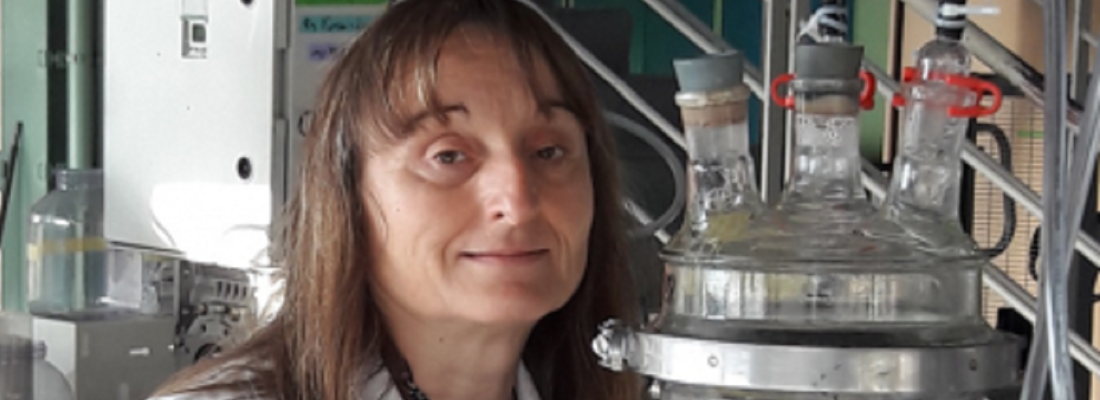Bioeconomy Reading time 5 min
Hélène Carrère: an authority on biomass processing
Published on 11 June 2021

Hélène Carrère is an engineer from the Ecole nationale supérieure de chimie in Toulouse and holds a doctorate in process engineering. For the past 20 years she has worked at the Laboratory for Environmental Biotechnology (INRAE Occitanie-Montpellier), where her research focuses on the concept of environmental biorefinery. This consists of processing residues, wastes, organic effluents from human activities into products of industrial interest (bioenergy, biomolecules and organic fertilizers) while minimizing their environmental and health impact.
A question of good chemistry
At the Laboratory for Environmental Biotechnology, Hélène Carrère, now an INRAE research director, leads activities to study and develop physico-chemical or biological pretreatments to improve the methanisation and fermentation of various substrates such as sewage sludge, plant by-products and lignocellulosic biomass, slurry or even algae.
Over the years, Hélène has been involved in a large number of research projects in collaboration with French and international academic and industrial partners.
The Stockactif - Smart Storage of Biomass to Enhance its Technological Conversion project (ANR, 2012-2016) was an opportunity to explore the possibility of making lignocellulosic biomass (straw, miscanthus, etc.) easier to process by accelerating and controlling a fungal pre-processing during storage, before it enters the factory.
Hélène also contributes to research carried out for the Biomass for the future - BFF project (ANR, 2012-2020). BFF aims to develop new varieties and value chains for miscanthus and sorghum, which have high lignocellulosic biomass yields with low environmental impact.
More recently, the ProDéH2 project: Pre-processing of waste for hydrogen production using dark fermentation – as opposed to the so-called photo-sensitive methods that require light during a certain phase – (Muse project, 2018-2021) allows her to simultaneously study the impact of pre-processing on the accessibility of sugars in waste and on the microbial consortia contributed by the latter.
Today, Hélène Carrère has extensive knowledge of the pre-processing of various types of biomass to optimise their bio-conversion into energy and co-products. Keen to share her knowledge and know-how, Hélène has also helped train – through and for research – 32 Master’s students, 18 doctorate students (plus seven foreign doctorate students who came to spend a few months in the laboratory) and six post-doctoral students. She has also hosted three guest researchers. She recently completed two theses on the (pre- and post-) processing and methanisation processes, in collaboration with Air Liquide and GRDF via a CIFRE industrial research agreement. This type of agreement aims to foster cooperation between public research laboratories and social and economic stakeholders; support the employment of doctorate students in companies, and to contribute to innovation in companies based in France.
A prolific scientific writer
Hélène Carrère has published an extensive list of scientific publications, with over 150 articles in peer-reviewed journals, book chapters, patents, etc.. This remarkable output recently made her one of the most cited researchers by their peers in 2018. This title, which she readily shares with her colleagues and students, has ensured that she is in high demand.
The list of Highly cited researchers (HiCi) distinguishes researchers in science whose work, published in selected reference journals (from a selection by Clarivate Analytics), has been cited extensively by their peers over the last decade.
In 2018, 6,080 scientists were named Highly Cited Researchers, including 158 French scientists, 15 of whom are colleagues at INRAE. It should be noted that this year is the first in which researchers such as Hélène Carrère, whose work interconnects several disciplines, have been included, in the Cross Field category.
Clarivate Analytics is a company that provides tools and services related to intellectual property and the production of scientific knowledge. It owns and manages, among others, the Web of Science, EndNote and Journal Citation Reports. (Source: Wikipedia).
What’s up next?
“(I plan) to continue my current activities while maintaining a balance between basic and applied research,” Hélène spontaneously replies when asked about what she’ll do next. She added: “The aim is to transfer research results to industrial applications”.
Hélène also wishes to try new multidisciplinary approaches – the study of the impact of this pre-processing on microbial communities, or of economic aspects, for example – and is thinking of other applications for fermentation by-products. These ideas are at the top of her to-do list, along with new research partnerships and encounters – which the COVID pandemic has made rare in recent months!
55 years old
• Since 2008: INRAE Research Director, Laboratory for Environmental Biotechnology, INRAE Occitanie Montpellier
• 2001-2008: INRAE Researcher, Laboratory for Environmental Biotechnology
• 1994-2001, INRAE Researcher, Joint Research Unit for Food Process Engineering and Microbiology INRAE, AgroParisTech), INRAE Île de France - Versailles-Grignon
• 1992-1994, Assistant research lecturer (ATER), Institut de Génie chimique, Toulouse
• Depuis 2018, Associate editor for Waste Management
• 2001, Accreditation to supervise research (HDR), Institut national Polytechnique de Toulouse
• 1993, Doctor of Process Engineering, Institut national Polytechnique de Toulouse
• 1990, Chemical Engineer, Ecole nationale supérieure de chimie de Toulouse.
|
Carrere H. et al. Review of pretreatment strategies for improved feedstocks anaerobic biodegradability: from lab-scale research to full-scale application, Bioresource Technology, 199 (2016) 386. Eskicioglu C. et al. Assessment of hydrothermal pretreatment of various lignocellulosic biomass with CO2 catalyst for enhanced methane and hydrogen production. Water Research, 120 (2017) 32. Elalami D. et al. Mild microwaves, ultrasonic and alkaline pretreatments for improving methane production: Impact on biochemical and structural properties of olive pomace, Bioresource Technology (2020) 299:122591. |
